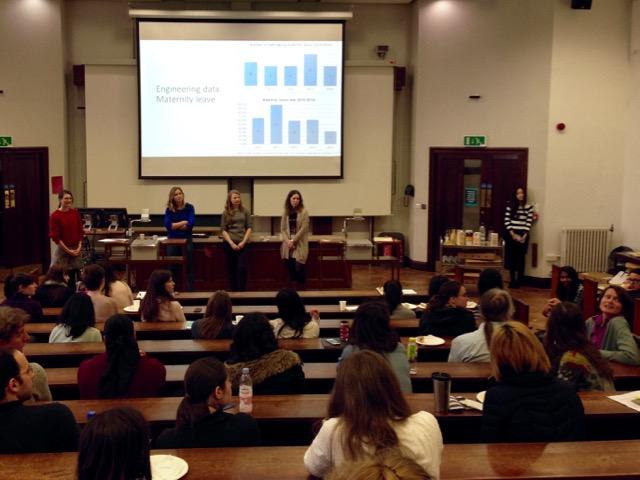
Submitted by Administrator on Tue, 16/02/2016 - 22:47
Why is it so hard to be a female researcher in engineering? Summary notes from the last Women in Engineering Forum.
It has been well documented that there is a shortage of females studying engineering, and huge efforts are being made to encourage more to consider this subject. However, it has also been noted that many females who study engineering do not stay in engineering once they have completed their studies. This Women in Engineering Forum was based around a panel discussion of this topic. The panelists were:
+ Stefania Radopoulou, 4th year Phd student in the Structures Research Group who is working on automating the way that road conditions are monitored, using sensors that already exist in vehicles.
+ Dr. Jenni Sidey, a research associate studying combustion. She completed her PhD at the University of Cambridge in 2015.
+ Cindy Valreau - final year PhD student in aeroacoustics.
The event was chaired by Camille Bilger, a PhD student whose research is on the simulation of fuel injection in jet engines.
Though the original intent had been to discuss why women leave engineering, the discussion quickly focused on to issues of why women engineers leave academia for jobs in industry. The broad ranging discussion and Q&A with the audience covered issues including:
- The relatively low salary levels in academia compared to industry, and the anticipated challenges of managing work/family and being successful in academia;
- The feeling that woman need to prove themselves, and the perceived need to go a step more than men to feel accepted/included/respected;
- Coping with the loneliness of research, especially if you are the only person working on a particular topic in research group;
- The feeling that you have to develop 'thick skin' to deal with criticism;
- The way in which some supervisors are really good at adapting their style of interaction depending on who they were working with, to help bring the best out of that person;
- Some women seem able to not be phased by inappropriate comments, and use them as spur to 'prove them wrong';
- Would things be any better in industry? It's even more destabilising in academia when these things happen because you expect academia to still be a nurturing/friendly environment. In industry, you'd expect a better salary to compensate for the stressful environment, but you'd also expect managers to have better people management skills (e.g. system in place to report bullying, more protection for maternity leave).
- Many of the issues covered in the discussion pointed to the need for the development of more professional people management skills from supervisors and PIs.
- Though many of the issues discussed related to situation facing PhD students, several comments from the audience showed how these issues also resonated with the experiences of undergraduates and postdoctoral researchers.

